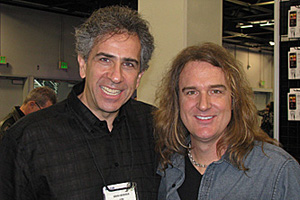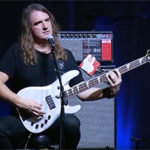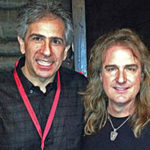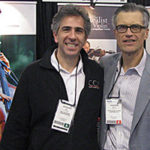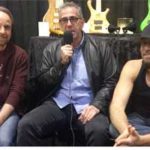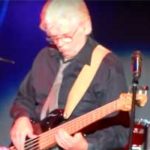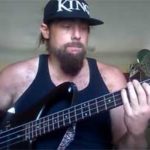Heavy metal icon tells FBPO about Megadeth, F5 and Hail, his relationship with Dave Mustaine and a personal comment on the passing of Ronnie James Dio
Exclusive interview with FBPO’s Jon Liebman
May 24, 2010
Electric bassist David Ellefson has become a mainstay in the rock and metal communities for over 25 years. Ellefson co-founded the iconic thrash metal band Megadeth in 1983 and remained the band’s bass player until 2002. David’s work has garnered him seven Grammy nominations, multiple gold and platinum records originating from over 20 studio albums and countless world tours.
An active songwriter, performer, record producer, bass guitar clinician and recording artist, David has also led his own bands, F5 and HAIL!.
David holds a bachelor’s degree in business and marketing from American Intercontinental University and authored the book Making Music Your Business … A Guide For Young Musicians, in addition to having released several instructional DVDs and other learning resources. He continues to lecture and educate on the subject of business in the music industry from the artist’s perspective, including his online YouTube series “David Ellefson’s Rock Shop.” In February 2010, David rejoined Megadeth, in time for the much anticipated “Rust In Peace” 20th anniversary tour.
FBPO: Let’s start from the beginning. What kind of musical upbringing did you have?
DE: I took the usual piano lessons, but in my house they were on my mother’s Wurlitzer organ. My teacher was a neighbor lady who taught and played at church. This was at age 8, or so. From there, I took up tenor saxophone in the fifth grade school band. But, at age 11 I took up electric bass after hearing bands like Sweet, Styx, KISS and so forth on the radio. Suddenly I loved hard rock and the electric bass became my calling.
FBPO: What’s the story behind the formation of Megadeth?
DE: I grew up on a farm outside a small town of 3,000 people, a town called Jackson, Minnesota. From the time I took up bass at age 11, I immediately started putting rock bands together with friends and regional musicians. I was not the stay-at-home practice guy, but rather a guy who practiced so I could be on stage. To me, being a touring/recording rock & roller was the aim from day one. Don’t get me wrong, I spent a ton of time in my basement learning to play and woodshed, but practicing was a means to an end, not an end in itself.
I had a hunch at age 16 that I should move to Los Angeles to get a band going, that my future was out there. I’m glad I followed that hunch because I moved to L.A. within five days after graduating from high school two years later, in 1983. My backup plan was to attend B.I.T. (Bass Institute of Technology, at the Musician’s Institute) but my real aim was to get into – or put together – a metal band.
Ironically, I moved into an apartment under Dave Mustaine, who had just been released from Metallica. In hindsight, our meeting was not coincidental because that hunch at age 16 was the good Lord putting things in motion and all those years preparing in rural Minnesota were the seeds planted for that pursuit, which became Megadeth.
See our follow-up interview with David, too!
FBPO: How far did you think the band would go? Were you surprised at how successful you were?
DE: I knew as soon as I met Dave that he was the “real deal” and that together we would set out to form a band that would in fact become successful. That is not meant to be proud or boastful, but you could really feel it in the room that it was going to be big.
Keep in mind, it didn’t just “become” big. We worked our tails off for the success we’ve enjoyed. I think for most musicians, the payout of success isn’t as important as the work you put into it because the work you put into it is part of the payout, the real enjoyment of doing what you love.
FBPO: The music world recently lost Ronnie James Dio, a powerful force in rock history. Do you have any special thoughts or feelings about Ronnie that you’d like to share?
DE: Ronnie James Dio was the ultimate singer/artist. He had his own unique vocal style, but was also an incredibly proficient and original writer. I was a fan as soon as I heard him on the Black Sabbath and Rainbow classics, but his solo work in Dio just propelled him — and heavy metal in general — to a really hip mainstream appeal for the masses. He is truly the stuff of legend.

FBPO’s Jon Liebman poses with David at the 2012 NAMM show
FBPO: Tell me about F5 and HAIL!
DE: When Megadeth came to an end in 2002 due to Dave’s arm injury, I had no idea what to do next. So, just like back in Minnesota when I was a kid, I followed my hunches and the trail of crumbs laid out before me. It really taught me the importance of reaching out and networking with people I knew in the music industry, which opened doors to new opportunities. One of those was songwriting and producing with a lot of signed and unsigned artists. Out of that, came my introductions to the guys in F5 and one day, a year later, we got in a room, threw some ideas around and… presto, a band was formed!
The successful people I admire, in all walks of life, network a lot. For a musician’s success, networking is just as important as playing, which is why so many musicians are never successful. Too many players spend all their time practicing on their fretboard rather than sharpening their skills on the phone or with email. Working musicians need to be connected to playing opportunities, which will open doors to new opportunities. I’m glad I had that realization early on.
As for HAIL!, a manager friend of mine kept calling me about putting together an all-star band to play some shows in South America. Finally, in the fall of 2008, I got serious about it, as I had just completed the “ROCK N ROLL FANTASY CAMP” tour and my work with that organization laid the groundwork for me to conceptualize HAIL!
FBPO: Talk a little bit about the books and other educational resources you’ve released.
DE: My book, Making Music Your Business: A Guide for Young Musicians, was written in 1994-95, during the Megadeth “Youthanasia” recording and tour cycle. My thought was that I would have bought a book by Gene Simmons or Geddy Lee if they had written one about the realities and day-to-day course of what it really takes to make it in the music business as an artist. So that became my inspiration to write a book from a working artist/player perspective, so younger musicians could learn from it. That book was released in 1997.
FBPO: What’s your Rock Shop all about?
DE: I have my YouTube video series, David Ellefson’s Rock Shop, which is really just a modern-day continuation of my book. It’s easier and simpler to just film an idea and post it, rather than write, publish and distribute a book these days, even though I don’t get paid for doing it. For me, it’s a labor of love and I think my fans appreciate that I do it, which is just as important as money or other pay-offs. Rock Shop is really me discussing music business topics, as well as going through some playing and recording concepts.
FBPO: How does it feel to be back with Megadeth?
DE: It’s great to be back! My time away was a good break to develop some other areas of interest, as well as my chops and songwriting in a new way. It all seems to have worked out the way it was meant to be.
FBPO: Would you care to comment on your relationship with Dave Mustaine? Are there any rumors you’d like to set straight?
DE: Everything is really, really good with us these days. Our time apart helped us grow as men and now we can really have a new friendship that has made the band so much better for all of us.
FBPO: What kind of equipment are you using these days?
DE: I use Hartke LH1000 amps and HyDrive 810 cabinets, Shure wireless, Jim Dunlop picks and S.I.T. nickel strings. For basses, I use primarily five-strings with Megadeth, which are Peavey, Jackson, Modulus and a B.C. Rich Mockingbird four-string for “Peace Sells.” I want to replicate and update the original sound and look of the vintage material and these are the tools that do that for me.
FBPO: What else would you like to accomplish in your career that you haven’t already done?
DE: I’m really happy with everything I’ve done. Obviously, my Megdeth work is pretty well documented, but my years away from the group allowed me to explore other types of music, too. That time also provided time for me to develop my songwriting and step out to play with other musicians. Playing with as many people as possible is vital if you are to keep growing as a player and songwriter.
FBPO: What do you like to do when you’re not immersed in music?
DE: I spend most of my free time with my family, as well as working out and keeping fit.
